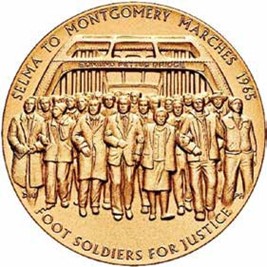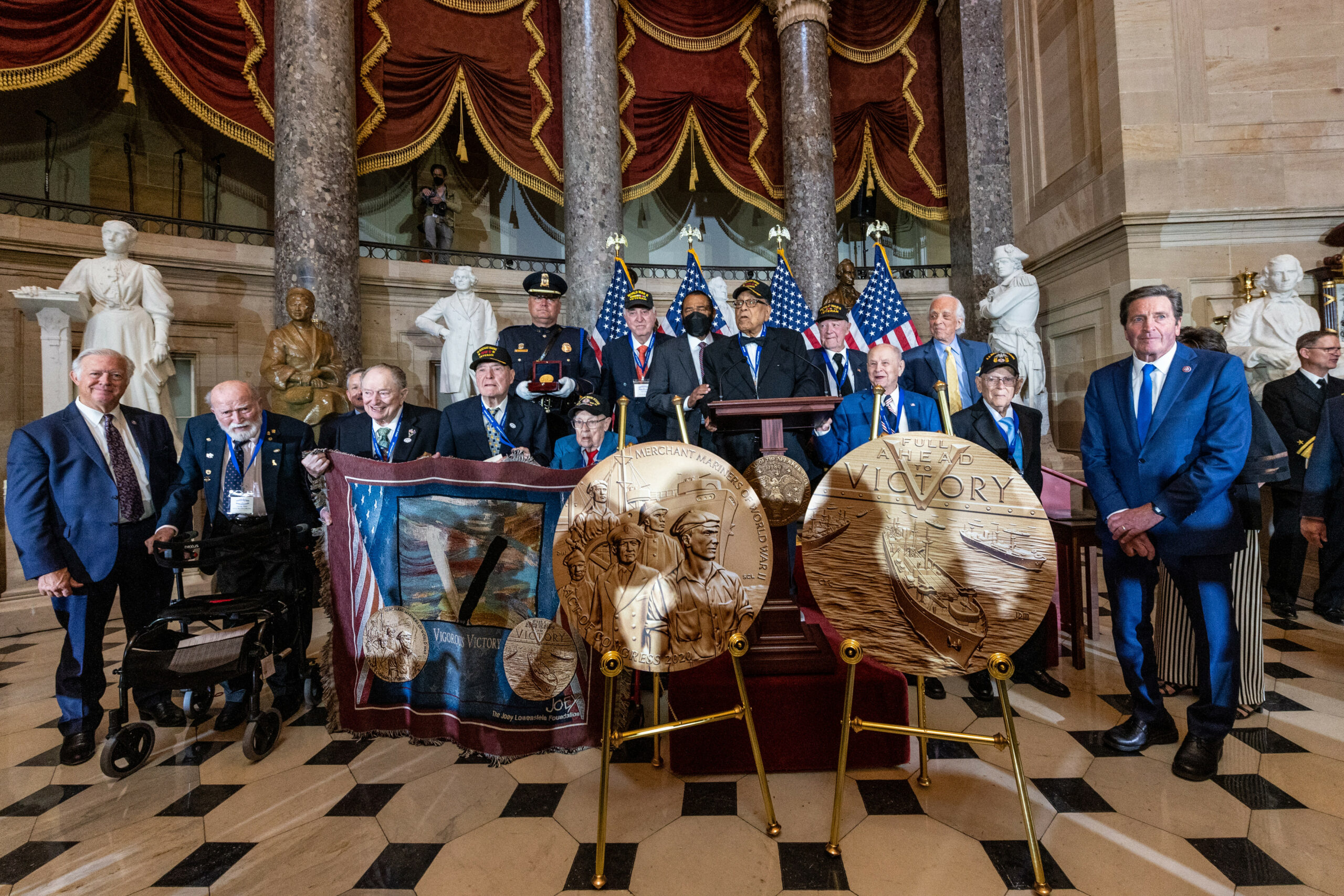A new effort seeks a Congressional Gold Medal to recognize the collective efforts of Peace Corps Volunteers
by Patrick Cotter and Duff Devine

The Congressional Medal awarded in 2016 to the “Foot Soldiers” for civil rights and justice.
Last year marked the 60th anniversary of the return of the first Peace Corps Volunteers to the United States. Members of Congress and all those who support the outstanding contributions of the Peace Corps should consider nominating Returned Peace Corps Volunteers as a group for a prestigious Congressional Gold Medal, an accolade that would encapsulate their profound impact across 140 nations. As many of the first Volunteers sent abroad enter their retirement years, now is the time to show our nation’s appreciation for their outstanding global accomplishments.
As President John F. Kennedy said in his remarks upon signing the Peace Corps Act on September 22, 1961, “These men and women are going overseas at the request of the host nations. They will be doing specific, needed jobs. They will be working at a level and living at a level comparable to the citizens of the foreign nations. They will be farmers and teachers, craftsmen and nurses, doctors and technicians of all kinds. They will be a cross-section of the finest men and women that this Nation has to offer.”
The accomplishments of RPCVs under this mandate undoubtedly qualify the group for a Congressional Gold Medal. Indeed, Peace Corps has received or been nominated for similarly prestigious awards in the past, including the Beyond War Award, which it received in 1987, and the Nobel Peace Prize, which it was nominated for in 2002. And in 2011, members of the House of Representatives issued a recommendation for President Barack Obama to nominate Peace Corps for a Nobel Peace Prize again.
The accomplishments of RPCVs undoubtedly qualify the group for a Congressional Gold Medal
Since 1776, about 170 Congressional Gold Medals have been issued to express “national appreciation for distinguished achievements and contributions” by individuals or institutions. The outstanding achievements of RPCVs in international humanitarian endeavors espousing peace are certainly deserving of a prestigious Congressional Gold Medal award honoring them as an institution or group.
Eligibility for the Congressional Gold Medal is quite flexible, allowing for a wide range of recipients. Nominees’ contributions can benefit American society or humanity as a whole, and can include military achievements, humanitarian efforts, cultural accomplishments, and more. While it’s more common for the medal to be awarded to individuals, it’s not impossible for it to be given directly to nonprofit organizations, especially in recognition of the collective efforts or impacts of a particular group or cause.
The Women Airforce Service Pilots (WASP) received the Congressional Gold Medal in 2009 in recognition of the service given by female pilots during World War II. Though not strictly a nonprofit, WASP was a group of women recognized for their contributions to winning the war. The same holds true for the Navajo Code Talkers, who were awarded the medal in 2000 for their role in developing an unbreakable code that contributed significantly to U.S. victories in the Pacific theater, as well as the Tuskegee Airmen, who received the Congressional Gold Medal in 2007 for their role in overcoming racial barriers and their significant contributions to the war effort. More recently, Congressional Gold Medals have been awarded to the foot soldiers who participated in the 1965 Selma to Montgomery Voting Rights March (2015) and to the U.S. Merchant Mariners of World War II (2020).

World War II Merchant Mariners were awarded the medal in May 18, 2022
While many individuals have received the award for their efforts on behalf of fostering peace—Nelson Mandela, the Dalai Lama, Martin Luther King Jr., and Mother Teresa, to name a few—no group specifically promoting peace has ever been recognized with a Congressional Gold Medal. Such recognition, alongside the congressionally approved Peace Corps Commemorative Park currently in development in Washington, D.C., would greatly demonstrate an official U.S. commitment not only to national security and military achievements, but also to worldwide endeavors of peace.
Any proposal to move such recognition forward must take into account a number of practical considerations. While the honor is undeniably deserved, it is also essential to consider funding for the creation and distribution of the medals. So, what might happen next? We propose the following actions for consideration by NPCA:
After Congress passes the 2023 Peace Corps Reauthorization Act, NPCA leadership, the NPCA Board of Directors, the NPCA Advisory Council, and members of affiliated Peace Corps groups should develop a communications strategy to promote nomination for the Congressional Gold Medal.
In consultation with Peace Corps head- quarters, NPCA should contact members of the House of Representatives’ National Service Caucus and the Senate Foreign Relations Committee to promote the development of a bill to honor RPCVs with a Congressional Gold Medal. This bill should include specific eligibility criteria.
As the draft bill moves through Congress, coordination on funding sources can proceed through discussions with congressional staff, Peace Corps leadership, NPCA, and NGOs that support Peace Corps.
If the bill is approved, a decision will need to be made regarding the cost of minting the Congressional Gold Medal and distributing copies of it to those RPCVs who meet the approved criteria. NPCA could lead promotional ideas and fundraising efforts to aid in contributing to those costs. According to the U.S. Mint, where the medals are produced, a 1.5-inch medal costs $20, and a 3-inch medal costs $160. The Peace Corps office could manage the review of applications and distribution of the medals.
The 60th anniversary of the return of the first Peace Corps Volunteers to the United States is the perfect time to honor RPCVs’ service to their country and to foreign nations with a Congressional Gold Medal. A group award is fitting to recognize the tens of thou- sands of RPCVs who have contributed their exceptional talents and practical knowledge to fostering world peace and friendship on behalf of the United States of America.
Patrick Cotter and Duff Devine became lifelong friends while serving in Barbados (1979–81). Patrick is a retired environmental scientist who worked on international marine pollution programs for the U.S. government. Duff is a retired property casualty insurance agent specializing in agriculture and nonprofits. You can contact Patrick at [email protected] or Duff at duffdevine@ sbcglobal.net to learn more about the Congressional Gold Medal initiative.
